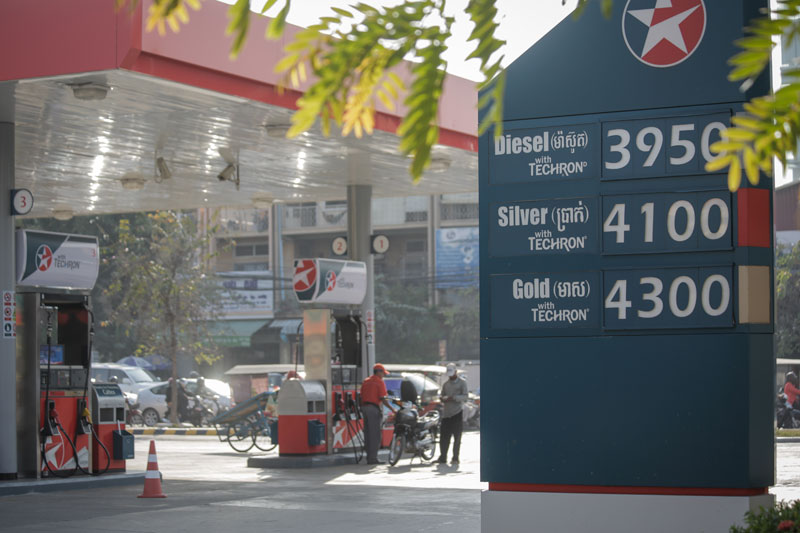The government has urged gasoline companies to pass on the full benefit of declining global oil prices to consumers and avoid price rigging, with average gas prices in the country dropping 6.5 percent over the past 10 days.
According to Ministry of Commerce data, the price of regular-grade gas, which ranged between 3,300 and 4,100 riel per liter Wednesday, fell between 3.5 and 13.2 percent since January 11. Diesel prices fell by between 2.5 and 17.7 percent.

The government met with gas companies on Tuesday—the third such meeting since November—and is planning to hold meetings every 10 days to ensure savings from cheaper oil are being reflected at the pumps and not boosting companies’ bottom lines, Mao Thora, secretary of state at the Commerce Mininstry, said Wednesday.
“Even though we can’t see the profit levels of the petroleum companies, we believe that [they] will be getting a lot of profit from the declining oil prices if they don’t reduce [the cost to consumers],” Mr. Thora said.
Global oil prices fell almost 50 percent over the course of last year, due largely to weak demand from countries with struggling economies and surging U.S. production. Brent crude, a benchmark for oil prices, was trading at just under $49 a barrel Wednesday, compared to almost $90 in late October.
Mr. Thora said the more gradual price drop in Cambodia is the result of negotiations between the government and private companies, rather than calculations based on global prices.
“We don’t have any methods to calculate how much these petroleum companies reduce their prices in line with declining global oil prices, but we just set up meetings and negotiations with them, and we don’t allow them to create a cartel,” he said.
Contacted Wednesday, Cambodia-based gas companies were sparse on details about the negotiations but said their prices were dictated by market forces.
“This is a free market; the government is not to control the price,” said Bin Many Mialia, marketing division manager of PTT (Cambodia) Ltd., a subsidiary of Thailand’s state-owned PTT Public Company Limited.
Chanlek Than, country spokeswoman for Caltex, the regional brand of U.S.-based oil giant Chevron, also said her company based its prices on market factors.
“[P]ump prices are dependent on a combination of several factors including currency exchange rates, market demand and competition,” Ms. Than said in an email.
Despite the government playing a role incongruous with what it touts as a free-market economy, experts say its engagement in the gas sector is needed given the absence of a solid legal framework.
Kang Chandararot, an economist who heads the Cambodia Institute of Development Study, said the government’s role was necessary to prevent gas companies from exploiting consumers.
“If the government does not [intervene], the petrol prices would not be lowered remarkably by companies, as we have seen in the past when the global price of oil has gone down,” he said.
“[This] is a sign that the petroleum companies in Cambodia have tried to create a conspiracy and this point reflects that the free market in the country does not operate well.”
Kim Natacha, executive director of local NGO Cambodians for Resource Revenue Transparency, said the country’s free market was “not perfect,” and in need of a consumer protection law.
“In the case of price fluctuation, such a law could also help prevent harmful practices such as hoarding, price gouging or price collusion. Those practices specifically harm consumers, who are the most vulnerable to price shocks in the market,” Ms. Natacha said.
“However, unfair competition practices, such as monopolies, oligopolies and cartels would be better covered under a Competition Law.”



